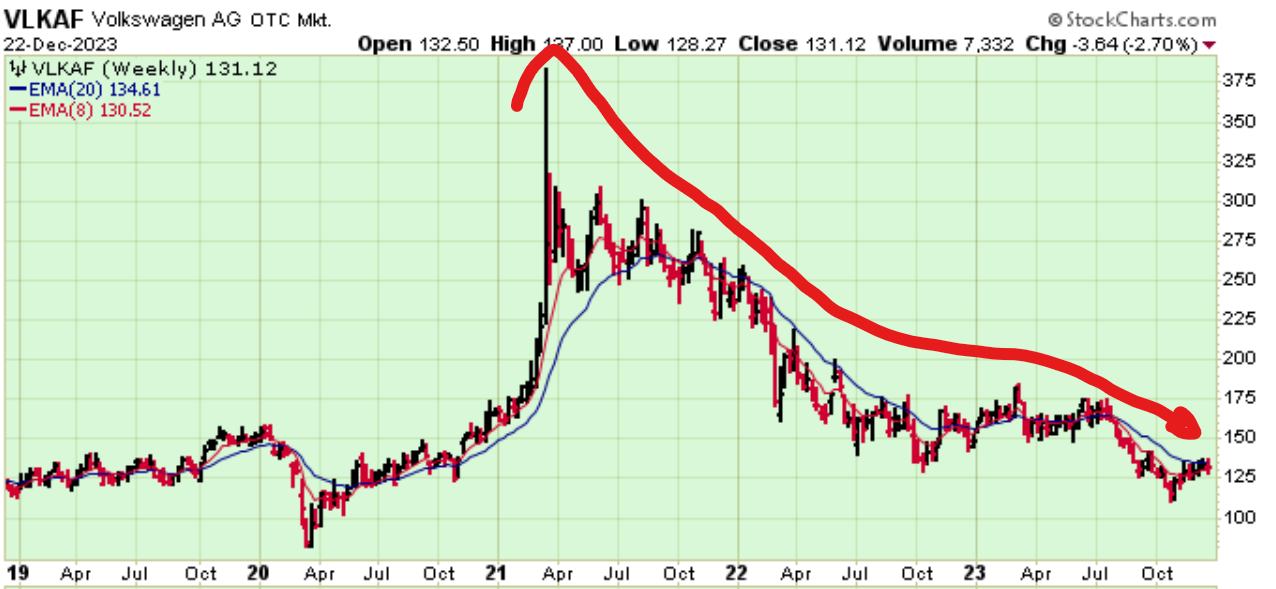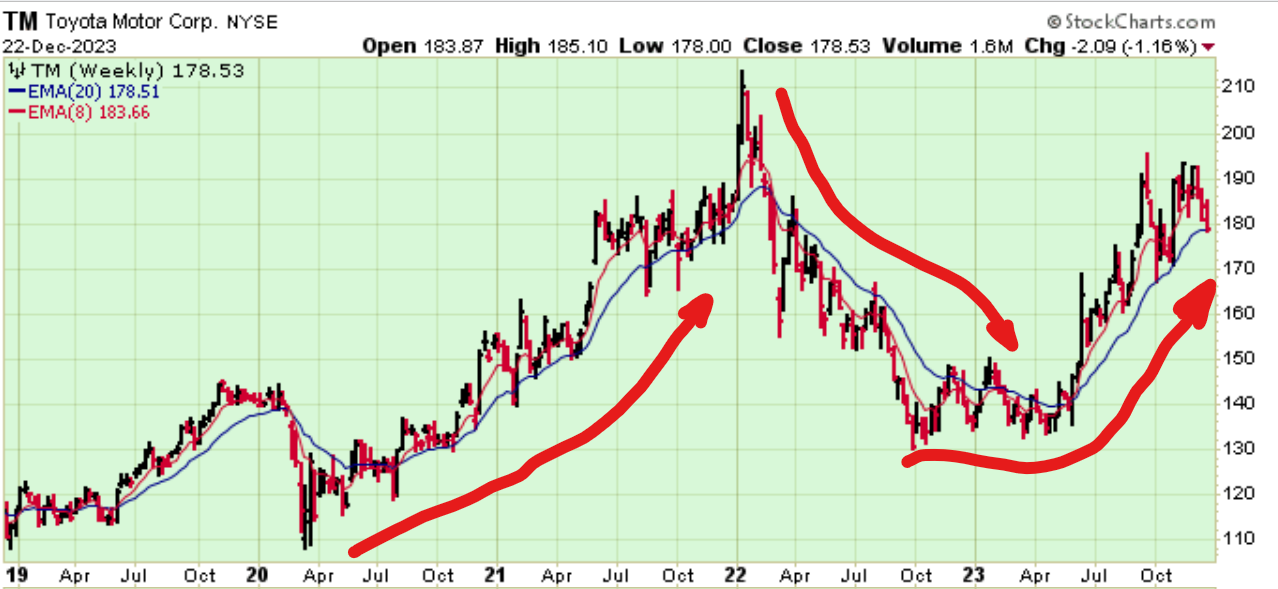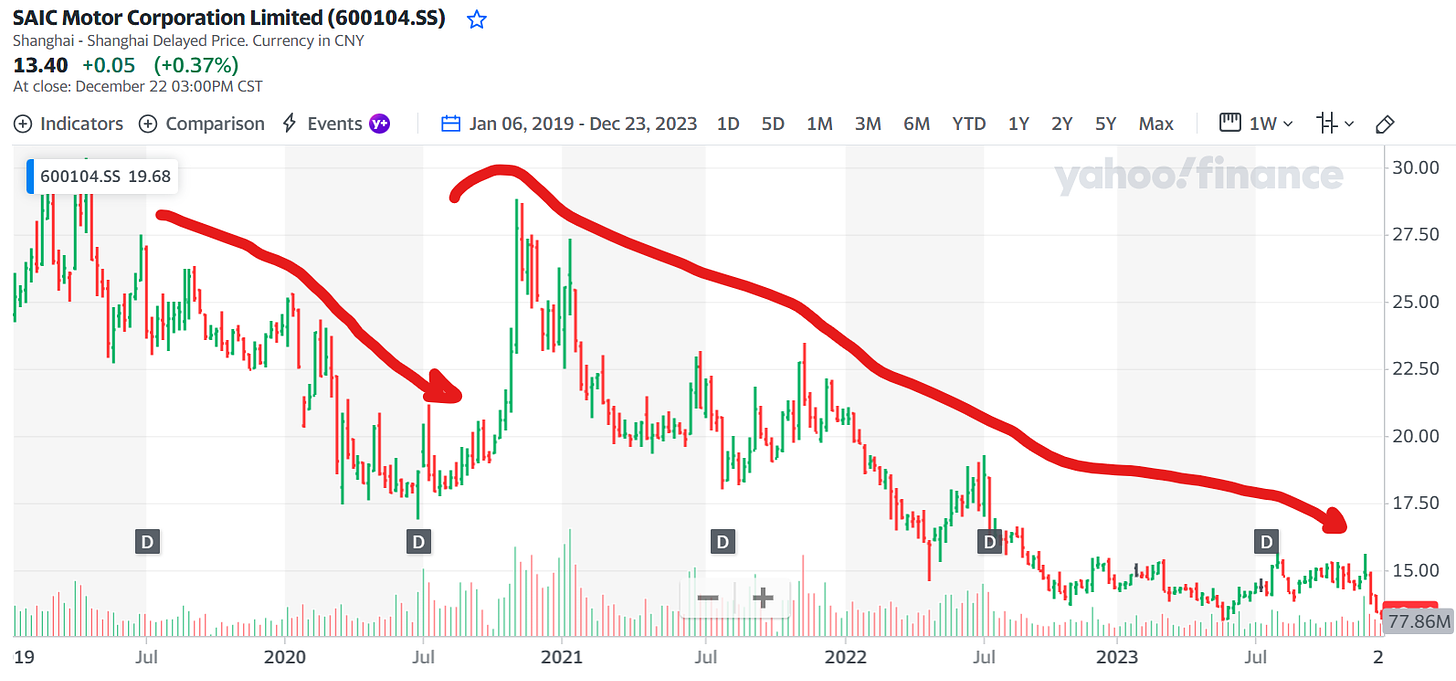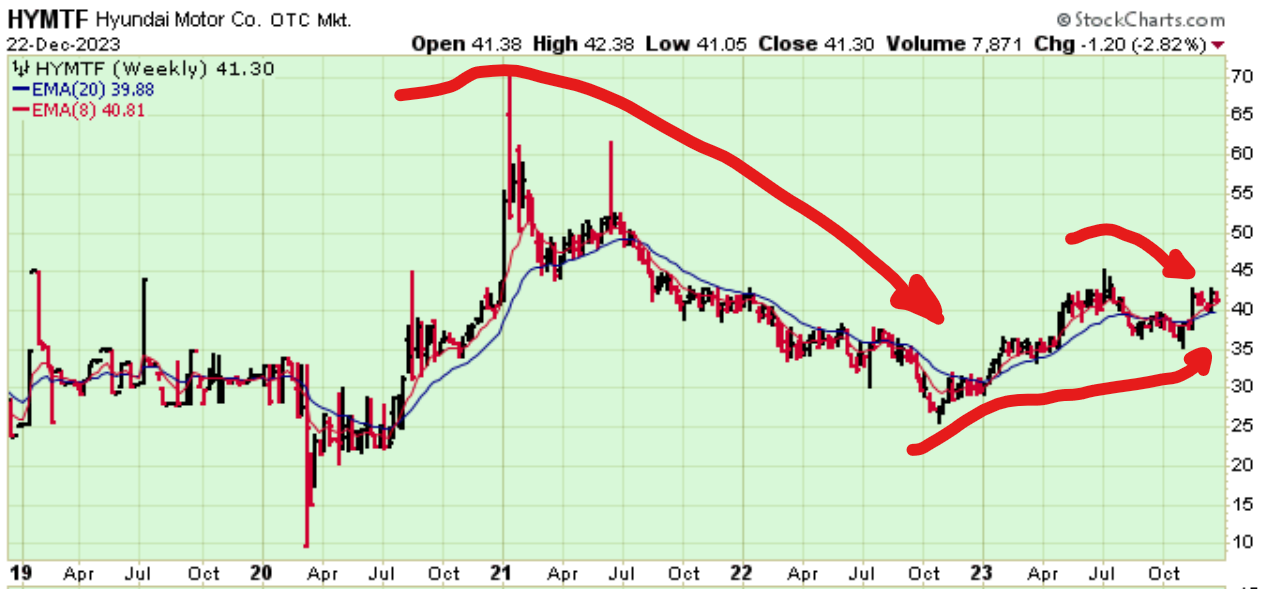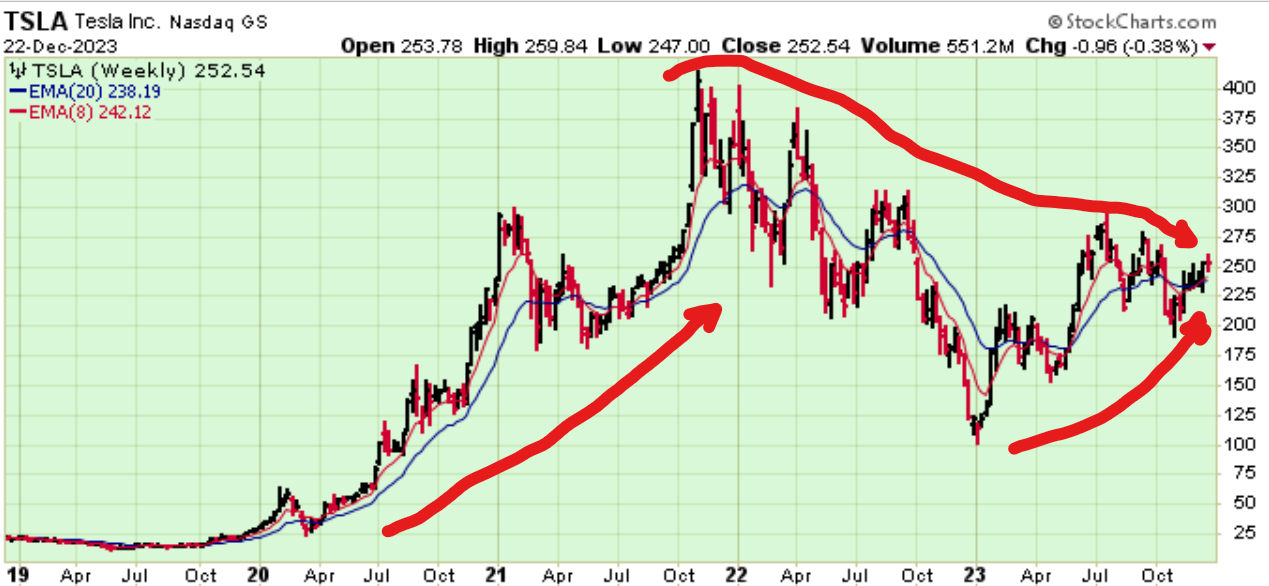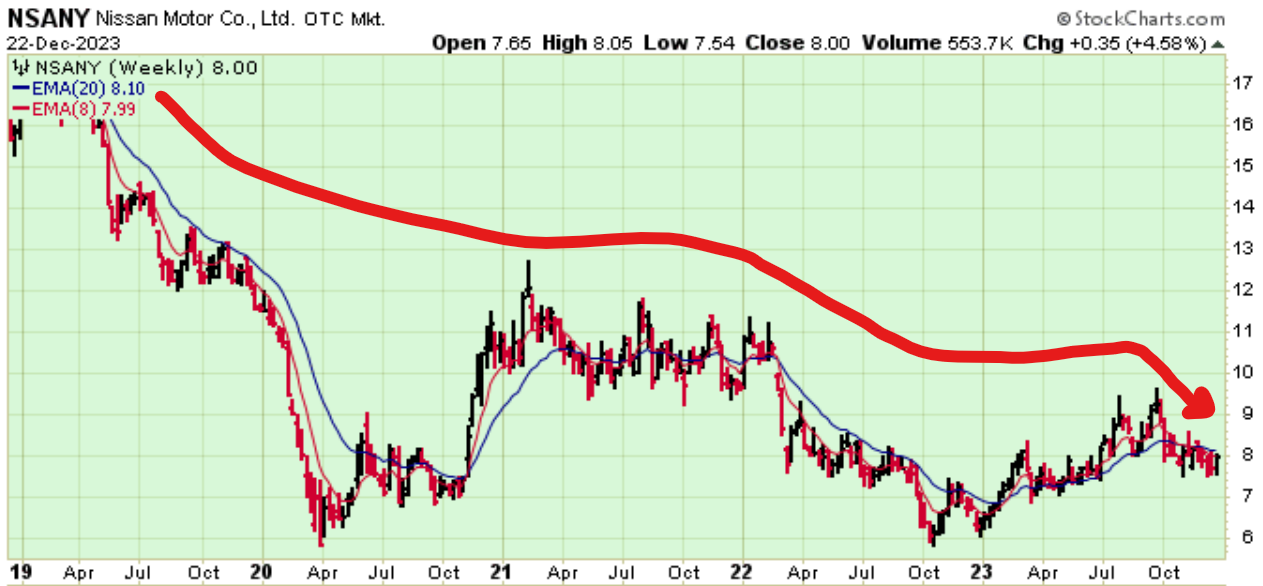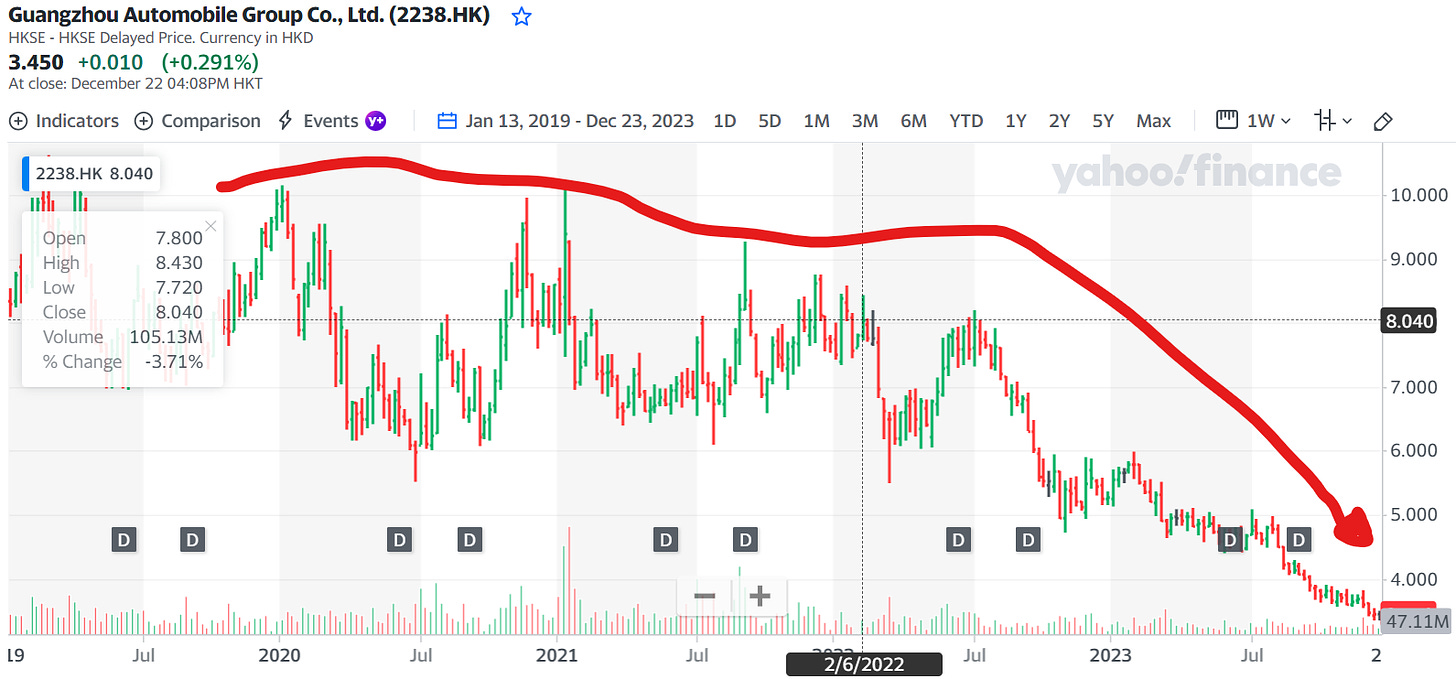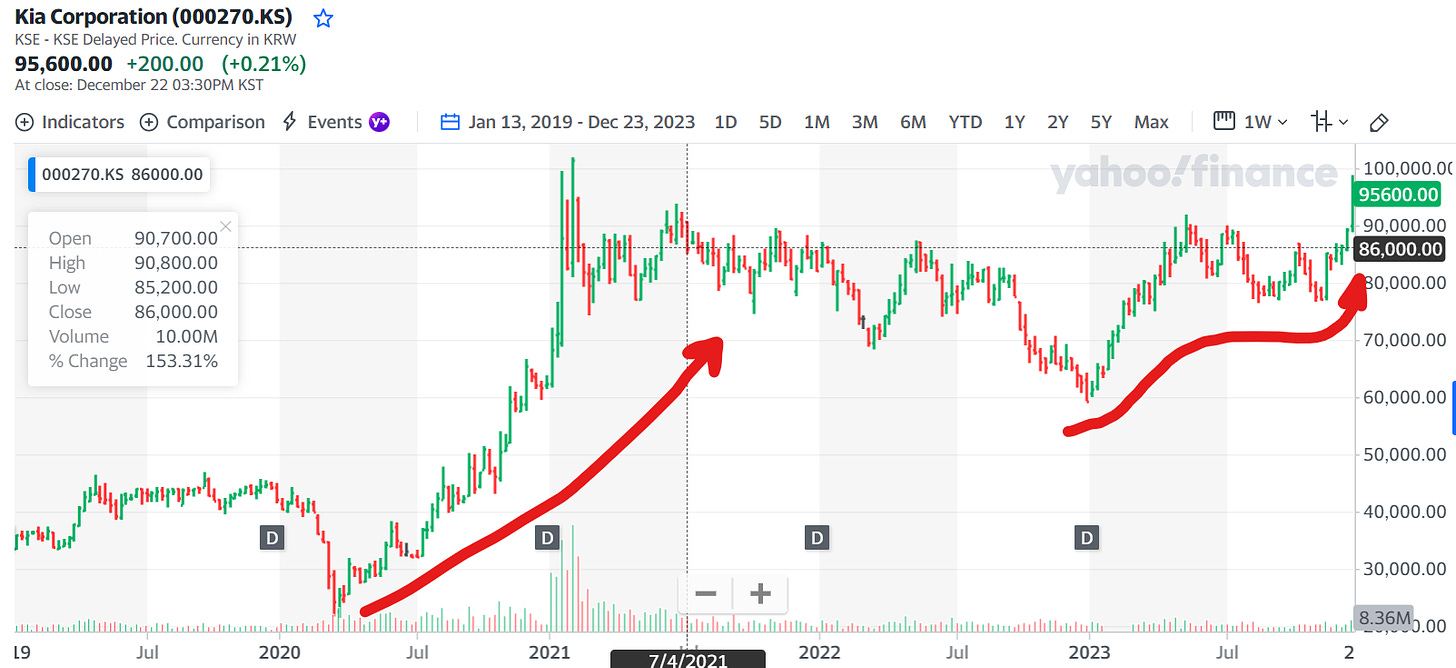BOOM Finance and Economics 24th December 2023 -- a Global Review
WEEKLY -- On Sunday -- All previous Editorials are available at LinkedIn and at Wordpress https://boomfinanceandeconomics.wordpress.com/
Merry Christmas and Happy New Year to all BOOM readers wherever you are. BOOM is published on many platforms – Substack, LinkedIn, Wordpress, the Burning Platform -- with a total readership each week of many thousands worldwide. It is a select readership of curious, well informed people interested in high level finance, economics, funds management, personal investment, geopolitics and financial markets.
Keep reading. BOOM expects 2024 will be a year of great consequence.
RUSSIA AND CHINA NO LONGER USING US DOLLAR IN TRADE SETTLEMENTS
IS THE VOLKSWAGEN BRAND NO LONGER “COMPETITIVE”?
TESLA IS THE EXCEPTION
MACQUARIE BANK TO PHASE OUT CASH – A POOR DECISION?
RUSSIA AND CHINA NO LONGER USING US DOLLAR
The trend to multipolarity in trade settlements continues within the BRICS group of nations and other associated nations. BOOM has often stated that this process will take 50 - 100 years to resolve US Dollar dominance in most international trade and capital settlements. In the fullness of time, that timeframe estimate may prove to be excessive.
On 19th December, the Russian Prime Minister Mikhail Mishustin announced that Western currencies have been almost completely phased out in Russia-China trade settlements. He said that nearly all payments between the countries are now carried out using Rubles and Yuan. This was a noteworthy statement, indicating a more rapid transition than expected.
The Russian PM was visiting Beijing to meet Li Qiang, the current Premier of China.
“We continue to increase the share of national currencies in mutual settlements. If in 2020 this figure was about 20%, then this year we have actually completely gotten rid of the currencies of third countries in mutual settlements,” Mishustin stated.
That statement indicates that full transition to multipolarity between those two nations has only taken 3 years.
India is a founding BRICS partner. They will be watching these developments closely. If they were to increase trade with China and Russia and settle those trades using Chinese Yuan, Russian Rubles and Indian Rupees, then over 3 Billion people could benefit from the trend to multipolarity. China, India, Russia, Brazil and South Africa (the original BRICS) make up 40 % of the global population.
BOOM will have to review the 50 - 100 year forecast on a regular basis.
IS THE VOLKSWAGEN BRAND NO LONGER “COMPETITIVE”?
In 1933, Ferdinand Porsche built the "Volksauto", a car with an air-cooled rear engine and a "beetle" shape. In 1934, Adolf Hitler got involved, placing the first orders. Volkswagen was established in 1937 by the German Labour Front (Deutsche Arbeitsfront) as part of the “Strength Through Joy” program (Kraft durch Freude). All of this was a dream come true for Adolf Hitler who had been a long term admirer of Henry Ford.
Volkswagen AG (VW) is now the largest car company in the world with a revenue of almost $ 300 Billion in 2022. Hitler should have stayed quietly at home.
However, on November 27th this year, 2023, Volkswagen's brand chief, Thomas Schaefer, reportedly said the car-maker's original brand is "no longer competitive" because of high costs and low productivity. A US $10.9 Billion savings program is planned which will include significant staff reductions. German manufacturers are struggling with higher energy costs and high wages costs.
On 12th November, BOOM reviewed the electric car sector and found that investors have fled from the companies involved with one exception, Tesla. It appeared apparent that this investor revolt is based upon an assessment that the sector is not commercially viable in the long run. This week, BOOM will look at the general car manufacturing sector.
Please Note: BOOM is biased towards European cars, currently owning a German car from a major manufacturer.
BOOM’s car is an extraordinary vehicle, 8 years old with not a single squeak or rattle from the body and almost no engine noise or tyre noise at any speed. Value for money, all things considered, it beats all other cars that BOOM has owned, including other German cars. But the most remarkable aspect is the fuel consumption. On long trips, unleaded fuel consumption can be as low as 5 – 6 litres per 100 Kms.
The coffee stops cost more than the fuel.
For US readers, 5 litres per 100kms is equivalent to 1.32 US gallons per 60 miles. That is 45 Miles per Gallon.
How can such a car be “no longer competitive”? What does this mean? It can only mean that the industry as a whole is in turmoil. Conventional “wisdom” says that the turmoil is coming from China and from electric cars. However, the facts don’t appear to support that hypothesis.
Here, we compare the Top 20 car manufacturers, based upon revenues, market capitalisation and share price performance over the last 5 years. Charts are from Stockcharts and Yahoo Finance – Ranked by Revenue in 2022.
Investors are currently buying the shares of Toyota (the company that has largely rejected the full electric trend), Stellantis (the French American Italian conglomerate), BMW (the German quiet achiever), KIA (the Korean quiet achiever) and Volvo (another European quiet achiever). Honda and Mercedes Benz are holding investors’ interest. All of these companies are not pursuing the electric car fad as much as others. But the most interesting observation is that the Chinese car companies are all being sold by investors. Their share prices are in steady downtrends. That is telling.
TESLA IS THE EXCEPTION
Tesla is the exception. It is only making electric cars and, so far, it is bucking the exit-electric trend with shareholders remaining faithful. It has been a great investment for those who got in early. However, its share price has been in downtrend for the last 2 years and its revenue and market capitalisation seem disconnected from financial reality. It has, by far and away, the largest market capitalisation “value” in the Top 20 at US$ 809 Billion — 10 times larger than VW — but its revenue is only $ 81 Billion versus VW’s $ 300 Billion. And this is in a market where buyer hesitancy for electric cars is growing.
BOOM feels that this valuation is extremely optimistic and is watching closely for any sign that may indicate investors’ loss of enthusiasm and trust. That will manifest as a stronger downtrend in share price. If Tesla shares fall again below US$ 150, it will all start to look precarious.
Examine the charts, the revenues and the market capitalisations closely. European car makers are not defeated yet. At this stage of the drama, both China and the electric car phenomenon have clearly failed to win the long term confidence of investors.
VW – Revenue US$ 300 Billion (approx) Market Capitalisation US$ 65.4 Billion
TOYOTA – Revenue US$ 280 Billion (approx) Market Capitalisation US$ 248 Billion
STELLANTIS
(Fiat Chrysler Citroen Dodge Jeep Peugeot Opel RAM Vauxhall)
Revenue US$ 176 Billion (approx) Market Capitalisation US$ 70.7 Billion
MERCEDES BENZ -- Revenue US$ 158 Billion (approx) Market Capitalisation US$ $ 74.5 Billion
FORD -- Revenue US$ 136 Billion (approx) Market Capitalisation US$ $ 48.5 Billion
BMW -- Revenue US$ 131 Billion (approx) Market Capitalisation US$ 73 Billion
HONDA -- Revenue US$ 127 Billion (approx) Market Capitalisation US$ 50 Billion
GM -- Revenue US$ 127 Billion (approx) Market Capitalisation US$ 49.6 Billion
SAIC (China) -- Revenue US$ 121 Billion (approx) Market Capitalisation US$ 21.8 Billion
FAW GROUP (China) -- Revenue US$ 109 Billion (approx) Market Capitalisation US$ 5.5 Billion
HYUNDAI -- Revenue US$ 102 Billion (approx) Market Capitalisation US$ 37 Billion
DONGFENG (China)-- Revenue US$ 86 Billion (approx) Market Capitalisation US$ 4 Billion
TESLA -- Revenue US$ 81 Billion (approx) Market Capitalisation US$ 809 Billion
NISSAN -- Revenue US$ 75 Billion (approx) Market Capitalisation US$ 15.5 Billion
BAIC (China Founded 1958) -- Revenue US$ 74 Billion (approx) Market Capitalisation US$ 2.4 Billion
GAC Group (China) -- Revenue US$ 67 Billion (approx) Market Capitalisation US$ 10.3 Billion
KIA -- Revenue US$ 61 Billion (approx) Market Capitalisation US$ 29 Billion
RENAULT GROUP -- Revenue US$ 54 Billion (approx) Market Capitalisation US$ 12.42 Billion
GEELY (China) -- Revenue US$ 56 Billion (approx) Market Capitalisation US$ 10 Billion
VOLVO -- Revenue US$ 43 Billion (approx) Market Capitalisation US$ 52 Billion
The most enthusiastic investors seem to be in Volvo, KIA, Honda, BMW, Mercedes and Stellantis. Tesla is in the balance. Investors are undecided on its future at this juncture.
Pessimism appears to be dominant in all the Chinese manufacturers.
MACQUARIE BANK TO PHASE OUT CASH – A POOR DECISION?
Macquarie Bank is Australia’s fifth largest bank.
Recently a Macquarie Bank spokesperson said -- "As a digital bank, we're committed to transitioning to completely digital payments by November 2024 as a safer, faster and convenient way to bank.”
"The majority of our customers already bank digitally and we're working very closely to support the less than 1 percent of our customers who currently use cheques or cash to ensure they have access to other digital payment methods."
Macquarie Bank will phase out its cash, cheque and phone payments for customers from next year as it moves to digital-only payment systems.
In a letter written to customers, Macquarie Bank said that by November 2024 customers will be unable to write or deposit cheques (including bank cheques), deposit or withdraw cash over the counter at NAB branches or make a super contribution or payment with a cheque. Macquarie Bank's telephone banking system will be scrapped in March next year, while in May cheques will be ditched completely.
Customers will also be no longer able to deposit or withdraw cash or cheques over the counter at Macquarie branches from May 2024.
To BOOM, this is a grave mistake. As long term readers will know, BOOM is a great admirer of cash in its ability to be a natural buffer for credit money excess in the money supply of any economy. BOOM expects the next big societal trend in all the advanced economies will be a return to using physical cash.
For any bank to openly turn its back on cash at this juncture is a direct challenge to its customers. Customers are familiar with cash. They understand its utility. They know that it can save them in an electrical blackout or in a natural disaster. They trust it. This experiment by Macquarie may backfire badly if they start losing customers. And if that were to happen, they will have to admit defeat and beg their customers to return. Such a situation for a major bank would be very worrying indeed. This experiment has a significant chance of failure. And such a failure could damage the bank’s reputation irrevocably.
In economics (and finance), things work until they don’t. Do your own research. Make your own conclusions. BOOM does not offer investment advice.
Disclaimer: All content is presented for educational and/or entertainment purposes only. Under no circumstances should it be mistaken for professional investment advice, nor is it at all intended to be taken as such. The commentary and other contents simply reflect the opinion of the authors alone on the current and future status of the markets and various economies. It is subject to error and change without notice. The presence of a link to a website does not indicate approval or endorsement of that web site or any services, products, or opinions that may be offered by them.
Neither the information nor any opinion expressed constitutes a solicitation to buy or sell any securities nor investments. Do NOT ever purchase any security or investment without doing your own and sufficient research. Neither BOOM Finance and Economics.com nor any of its principals or contributors are under any obligation to update or keep current the information contained herein. The principals and related parties may at times have positions in the securities or investments referred to and may make purchases or sales of these securities and investments while this site is live. The analysis contained is based on both technical and fundamental research.
Although the information contained is derived from sources which are believed to be reliable, they cannot be guaranteed.
Disclosure: We accept no advertising or compensation, and have no material connection to any products, brands, topics or companies mentioned anywhere on the site.
Fair Use Notice: This site contains copyrighted material the use of which has not always been specifically authorized by the copyright owner. We are making such material available in our efforts to advance understanding of issues of economic and social significance. We believe this constitutes a ‘fair use’ of any such copyrighted material as provided for in section 107 of the US Copyright Law. In accordance with Title 17 U.S.C. Section 107, the material on this site is distributed without profit. If you wish to use copyrighted material from this site for purposes of your own that go beyond ‘fair use’, you must obtain permission from the copyright owner.
Subscribe to BOOM Finance and Economics Substack
BOOM has developed a loyal readership which includes many of the world’s most senior economists, central bankers, fund managers and academics.





